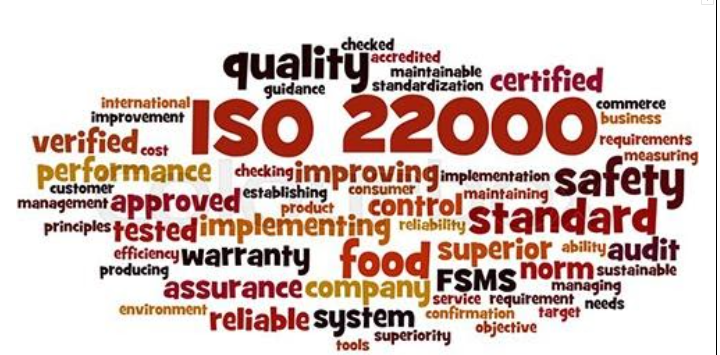I. Introduction
A. Brief overview of ISO 22000 Certification
Providing a succinct introduction to ISO 22000 Certification, this standard concentrates on managing food safety systems. It delineates the criteria for food industry organizations to guarantee the safety of food items across the entire supply chain, spanning from production to consumption. ISO 22000 Certification is instrumental in establishing robust protocols and procedures to identify, prevent, and address potential hazards associated with food production and distribution, thereby safeguarding consumer health and fostering trust in the global food supply.
B. Significance of Food Safety Standards in the Global Market
Recognizing the significance of food safety standards in the contemporary global market is paramount. These standards serve as linchpins in preserving public health, instilling consumer trust, and fostering seamless international trade. Adherence to stringent food safety standards like ISO 22000 is imperative for businesses to fulfill regulatory mandates, manage risks effectively, and uphold a strong competitive position within the industry. Compliance with such standards not only ensures product integrity but also enhances brand reputation and credibility, contributing to long-term sustainability and success in the global marketplace.
II. Advantages of ISO 22000 Certification
A. Ensuring Food Safety
Ensuring food product safety stands as a paramount concern for businesses operating in the food industry. Through ISO 22000 Certification, companies access a robust framework tailored for establishing effective food safety management systems. This comprehensive approach empowers organizations to detect and address potential hazards proactively at each stage of the food production process. Strict adherence to ISO 22000 standards enables businesses to greatly enhance consumer trust in product safety and quality, resulting in a significant decrease in the risk of foodborne illnesses and ultimately playing a pivotal role in safeguarding public health.
B. Enhancing Credibility and Trust
Achieving ISO 22000 Certification demonstrates a company’s commitment to upholding the highest standards of food safety and quality management. This certification serves as a powerful indicator of credibility and trustworthiness to consumers, suppliers, and regulatory authorities. By adhering to internationally recognized standards, organizations can differentiate themselves in the market, gaining a competitive edge and fostering long-term relationships with stakeholders.
III. Process of Achieving ISO 22000 Certification
A. Preparation for Certification
Prior to acquiring ISO 22000 Certification, comprehensive preparation is vital. This includes evaluating current procedures, pinpointing areas of improvement, and creating a structured plan for adherence. Companies need to allocate resources, designate a committed team, and deliver essential training to facilitate a seamless certification journey. This preparatory phase lays the groundwork for successful compliance, ensuring that the organization is equipped to meet the stringent requirements of ISO 22000 standards. By undertaking these measures diligently, businesses can streamline the certification process, bolster their commitment to food safety, and ultimately enhance their standing within the industry.
B. Implementation of ISO 22000 Standard
After the preparation phase, organizations move forward into the implementation stage. Here, they integrate the requirements outlined in the ISO 22000 standard into their existing food safety management systems. This involves documenting procedures, setting up controls, and closely monitoring operations to ensure they align with ISO 22000 standards. This thorough implementation process serves as the foundation for attaining and sustaining compliance, cultivating a culture of food safety excellence within the organization.
C. Conducting Internal Audits Internal audits
Internal audits are pivotal within the certification journey, serving as a cornerstone of the process. Regular audits are imperative for organizations to gauge the efficacy of their food safety management systems and pinpoint avenues for enhancement. These internal assessments play a vital role in aligning processes with ISO 22000 standards, ensuring robust compliance. Additionally, they serve as invaluable preparation for external certification audits, enabling organizations to fine-tune their practices and address any potential issues proactively. By conducting thorough internal audits, businesses can uphold the integrity of their food safety measures, instill confidence among stakeholders, and ultimately fortify their position within the industry.
IV. ISO 22000 Certification Compared to Other Food Safety Standards
A. Comparing with HACCP
When comparing ISO 22000 Certification with HACCP, it’s evident that ISO 22000 provides a holistic approach to ensuring food safety across the entire production process. In contrast, HACCP primarily centers on identifying and managing critical food safety hazards at specific production stages. While ISO 22000 offers a comprehensive framework for managing food safety, HACCP focuses more narrowly on crucial control points within the production process. Despite their differences, both standards play vital roles in enhancing food safety practices and protecting consumer health.
B. Contrasting ISO 22000 with FSSC 22000 and BRCGS
When comparing ISO 22000 to FSSC 22000 and BRCGS, it’s important to note their distinct focuses and requirements. While all three standards are widely acknowledged in the food industry, they each cater to different aspects of food safety. FSSC 22000, for instance, expands on ISO 22000 by incorporating additional criteria tailored specifically for food packaging manufacturers. On the other hand, BRCGS, or British Retail Consortium Global Standards, prioritizes aspects such as product safety, quality, and operational criteria within the food sector. While ISO 22000 offers a comprehensive framework for managing food safety, FSSC 22000 and BRCGS provide specialized approaches tailored to specific segments within the food industry.
V. Sustaining ISO 22000 Certification
A. Continuous Improvement and Review Procedures
Maintaining ISO 22000 Certification necessitates the establishment of strong protocols for ongoing enhancement and periodic evaluation. This entails consistently evaluating and refining food safety management systems to address emerging threats and adapt to evolving industry norms. By fostering an environment that encourages continual improvement, organizations can respond effectively to shifting dynamics and elevate the efficiency of their food safety protocols.
B. Managing Non-Conformities and Corrective Actions
Effectively managing non-conformities and executing corrective actions is imperative to maintain ISO 22000 Certification. Organizations must swiftly rectify any deviations from established food safety standards and implement corrective measures to prevent their reoccurrence. This proactive stance guarantees that food safety management systems retain their efficacy and align with ISO 22000 prerequisites, thus ensuring continued compliance and upholding the integrity of the certification.
C. Recertification Process
Recertification is a crucial aspect of maintaining ISO 22000 Certification. Organizations must undergo periodic audits to verify ongoing compliance with ISO 22000 standards. The recertification process involves a thorough assessment of food safety management systems, including documentation, procedures, and controls. By successfully completing the recertification process, businesses demonstrate their continued commitment to food safety excellence and ensure the validity of their ISO 22000 Certification.
VI. Conclusion
A. Summary of Key Points
In essence, the maintenance of ISO 22000 Certification demands that organizations develop robust systems for ongoing enhancement and promptly rectify any deviations through corrective measures. Furthermore, consistent evaluation and adherence to industry benchmarks are vital for upholding certification standards. This underscores the importance of a proactive approach to food safety management, ensuring continual compliance and bolstering trust in the integrity of the certification.
B. Final Reflections on the Importance of ISO 22000 Certification
ISO 22000 Certification holds significant importance in guaranteeing food safety and quality across the food industry. This certification equips organizations with a holistic framework to proficiently mitigate food safety risks and comply with regulatory standards. By acquiring and upholding ISO 22000 Certification, businesses showcase their dedication to upholding the highest standards of food safety, thus ensuring the well-being of consumers and instilling confidence in their products. Ultimately, ISO 22000 Certification serves as a testament to a company’s unwavering commitment to excellence in food safety practices, fostering trust and credibility in the marketplace.











